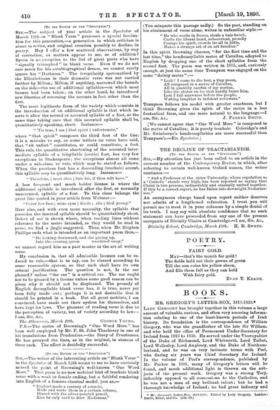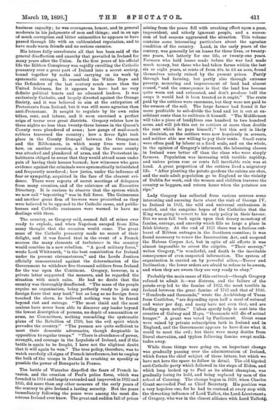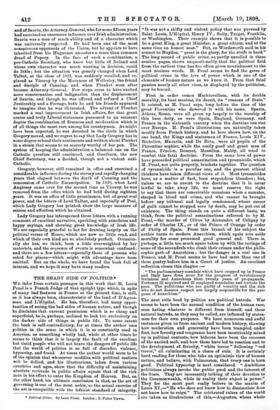BOOKS.
MR. GREGORY'S LETTER-BOX, 1813-1830.*
LADY GREGORY has brought together in this volume a large amount of valuable, curious, and often very amusing informa- tion relating to one of the least-known periods of Irish history. Its foundation is the correspondence of William Gregory, who was the grandfather of the late Sir William, and who held the office of Permanent Under-Secretary for Ireland from 1813 to 1830. He served under the Viceroyalties of the Duke of Richmond, Lord Whitworth, Lord Talbot, Lord Wellesley, Lord Anglesey, and the Duke of Northum- berland, and he was on very intimate terms with Peel, who during six years was Chief Secretary for Ireland. In the volume of Peel's correspondence, published by Mr. Parker in 1891, many of Gregory's letters will be found, and much additional light is thrown on the sub- jects of the present work. Gregory was a strong Tory, inflexibly opposed to all concessions to the Catholics, and he was not a man of any brilliant talent ; but he had a thorough knowledge of Ireland; he had great industry and • Mr. Gregory's Latter-Rex, 1819-1830. Edited by Lady Gregory. London: Smith, Rider, and Co. (12e. 6d.]
business capacity; he was courageous, honest, and in general moderate in his judgments of men and things; and in an age of much corruption and bitter animosities be appears to have passed through life with an unblemished reputation, and to have made warm friends and no serious enemies.
His letters fully corroborate all that has been said of the general disaffection and anarchy that prevailed in Ireland for many years after the Union. In the first years of his official life the Ribbon Conspiracy was rapidly enrolling the Catholic peasantry over a great part of Ireland into a secret society, bound together by oaths and carrying on its work by systematic outrages. It resembled the White Boys and the Defenders of the last century much more than the United Irishmen, for it appears to have had no very definite political tenets and no educated leaders. It was exclusively Catholic, and largely directed against the Orange Society, and it was believed to aim at the extirpation of Protestants from Ireland, but it was still more agrarian than anti-Protestant. It sought to regulate by its own rules tithes, rent, and labour, and it soon exercised a perfect reign of terror over great districts. Gregory relates how in three nights no less than twenty-three houses in the Queen's County were plundered of arms; how gangs of mail-coach robbers traversed the country; how a fierce fight took place in the County Donegal between the Orangemen and the Ribbonmen, in which many lives were lost ; how, on another occasion, a village in the same county was attacked and plundered of arms, and the Protestant in- habitants obliged to swear that they would attend mass under pain of having their houses burned; how witnesses who gave evidence against the criminals were systematically intimidated and frequently murdered ; how juries, under the influence of fear or sympathy, acquitted in the face of the clearest evi- dence. There were reports of secret meetings of delegates from many counties, and of the existence of an Executive Directory. It is curious to observe that the system which we now call " boycotting " was in full force. The Guinnesses and another great firm of brewers were proscribed as they were believed to be opposed to the Catholic cause, and public- houses and Catholic customers were warned to have no dealings with them.
The country, as Gregory said, seemed full of mines ever ready to explode, and when Napoleon escaped from Elba many thought that the occasion would come. The great mass of the Catholic peasantry made no secret of their delight, and it was feared that in the event of a French success the many elements of turbulence in the country would combine in a new rebellion. "A good military force," wrote Lord Whitworth, "is the best constitution for Ireland under its present circumstances," and the Lords Justices officially remonstrated against the determination of the Government to withdraw five thousand soldiers from Ireland for the war upon the Continent. Gregory, however, in a. private letter supported the measure, and he regarded the situation with much calm. He had no doubt that the country was thoroughly disaffected. "The mass of the people require no organisation, being perfectly ready to join any foreign force that may land," but as long as no foreign force touched the shore, he believed nothing was to be feared beyond riot and outrage. "The most timid and the most zealous have never been able to discover any leader beyond the lowest description of persons, no depot of ammunition or arms, no Committees, nothing resembling the systematic plans of the Rebellion of 1798, but the evil spirit which pervades the country." "The yeomen are quite sufficient to meet their domestic adversaries, though despicable in opposition to regular troops." "There is abundance of power, strength, and courage in the Loyalists of Ireland, and if the battle is again to be fought, I have not the slightest doubt that it will again be won." The true policy, therefore, was to watch carefully all signs of French interference, but to employ the bulk of the troops in Ireland in crushing as speedily as possible the power of Bonaparte in France.
The battle of Waterloo dispelled the fears of French in- vasion, and the creation of Peel's police force, which was founded in 1814 and largely extended and improved in 1822 and 1835, did more than any other measure of the early years of the century to give Ireland a lasting security. But the years immediately following the peace were among the most dis- astrous Ireland ever knew. The great and sudden fall of prices arising from the peace fell with *rushing effect upon a poor, improvident, and utterly ignorant people, and a suave- sion of bad seasons aggravated the situation. This volume contains some interesting particulars about the agrarian condition of the country. Land, in the early years of the century, was generally let on leases for three lives, or twenty- one years, but latterly for one life, or twenty-one years. Farmers who held leases made before the war had made much money, but those who had taken farms within the last six or eight years, at rents of from 40s. to £4 an aore, found themselves utterly ruined by the present prices. Partly through bad farming, but partly also through extreme poverty, manuring and improvement of land had almost ceased, "and the consequence is that the land has become quite worn out and exhausted, and don't produce half the crops it would had it been treated as it ought." The rents paid by the cottiers were enormous, but they were not paid to the owners of the Boil. The large farmer had found it far more profitable to sub-divide the land and let it out at ex- orbitant rents than to cultivate it himself. "The Middleman will take a piece of landifrom one hundred to two hundred acres, and will job this out to cottiers at more than double the rent which he pays himself ; " but this evil is likely to diminish, as the cottiers were now hopelessly in arrears, and neither able nor willing to pay their rents. Small rents were often paid by labour at a fixed scale, and on the whole, in the opinion of Gregory's informant, the labouring classes in Ireland were better off than the class who were simply farmers. Population was increasing with terrible rapidity, and unless prices rose or rents fell inevitable ruin was at hand. A great proportion of the cottiers lived a migratory life. "After planting the potato gardens the cabins are shut, and the male adult population go to England or the vicinity of Dublin for work, and the women and children traverse the country as beggars, and return home when the potatoes are ripe."
Lady Gregory has collected from various sources some interesting and amusing facts about the visit of George IV. to Ireland in 1821, the wild and universal enthusiasm it excited, and the sanguine hopes of the Catholics that the King was going to revert to his early policy in their favour. But we soon fall back again upon that dreary monotony of famine, outrage, and anarchy which fills so large a place in Irish history. At the end of 1821 there was a furious out- burst of Ribbon outrages in the Southern counties; it was found necessary to renew the Insurrection Act, and suspend the Habeas Corpus Act, but in spite of all efforts it was almost impossible to arrest the culprits. "Their secrecy." writes Gregory, "is wonderful, and death is the inevitable consequence of even suspected information. The system of organisation is carried on by powerful allies,—Terror and Inclination ; the lower orders are afraid to refuse to be sworn, and when they are sworn they are very ready to obey."
Probably the main cause of this outbreak—though Gregory refused to admit it—was distress, and the failure of the potato crop led to the famine of 1822, the most terrible in Ireland between the great famine of 1742 and that of 1846. "Hundreds and thousands," wrote the Archbishop of Tut= from Castlebar, "are depending upon half a meal of oatmeal and water per day, and many have not even that, and are feeding upon nettles." Unless speedy help is sent into the counties of Galway and Mayo, "thousands will die of actual hunger." A grant was voted by Parliament. Great sums were raised by private subscription both in Ireland and is England, and the Government appears to have done what it could to meet the evil ; but there were many deaths from literal starvation, and typhus following famine swept multi- tudes away.
While these things were going on, an important change was gradually passing over the administration of Ireland, which forms the chief subject of these letters, but which we have not here the space to follow in detail. The old bigoted anti-Catholic party which followed in the steps of Eldon, and which long looked up to Peel as its ablest champion, was gradually losing its hold, and being replaced by men of the school of Canning. The change began in 1818, when Charles Grant succeeded Peel as Chief Secretary. His position was a very hopeless one, for he had to contend at every step with the thwarting influence of Lord Talbot, the Lord-Lieutenante of Gregory, who was in the closest alliance with Lord Talbote
and of Sanrin, the Attorney-General, who for some fifteen years had exercised an enormous influence over Irish administration. Saurin was a man of much ability and of a character which was universally respected. He had been one of the most conspicuous opponents of the -Union, but he appears to have inherited from his Huguenot ancestors a more than common dread of Popery. In the face of such a combination, a pro-Catholic Secretary, who knew but little of Ireland and whose own character was much wanting in decision, could do little ; but the situation was greatly changed when Lord Talbot, at the close of 1821, was suddenly recalled, and re- placed as Viceroy by the Marquess of Wellesley, the friend and disciple of Canning, and when Plunket soon after became Attorney-General. Few steps seem to have excited more consternation and indignation than the displacement of Saurin, and though he was offered and refused a Chief Juaticeship and a Peerage, both he and his friends appeared to imagine that he was ill-treated. The advent of Plunket marked a real improvement in Irish affairs, for that great orator and truly Liberal statesman possessed to an eminent degree the combination of firmness and moderation which is of all things the most rare among his countrymen. As might have been expected, he was detested in the circle in which Gregory moved, and we regret to say that Lady Gregory has in some degree echoed their sentiments and written about Plunket in a strain that seems to us scarcely worthy of her pen. The system of keeping the administration a balanced one on the Catholic question still continued, and Goulburn, the new Chief Secretary, was a decided, though not a violent anti- Catholic.
Gregory, however, still remained in office and exercised a considerable influence during the stormy and rapidly changing years that elapsed between the death of Canning and the concession of Catholic Emancipation. In 1830, when Lord Anglesey came over for the second time as Viceroy, he was removed from the office which be had held during eighteen years. It was an office of little prominence, but of great real power, and the letters of Lord Talbot, and especially of Peel, which Lady Gregory has printed, show the large measure of esteem and affection which he obtained.
Lady Gregory has interspersed these letters with a running comment of excellent narrative, sparkling with anecdotes and happy sayings, and showing great knowledge of Irish life. We are especially grateful to her for drawing largely on the political verses of Moore, which are now so little read, and which of their own kind are BO absolutely perfect. Occasion- ally she has, we think, been a little overweighted by her materials, and the sequence of events is somewhat confused; and there are a few letters—especially those of persons who asked for places—which might with advantage have been omitted. But on the whole, we have found the book full of interest, and we hope it may have many readers.








































 Previous page
Previous page